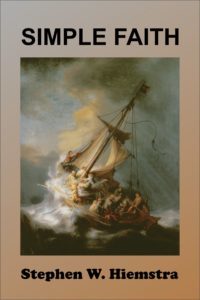Stephen W. Hiemstra's Blog, page 206
June 17, 2018
Prayer for the Co-Dependent
 By Stephen W. Hiemstra
By Stephen W. Hiemstra
Loving Father:
We praise you for the many blessings of this life: for family, good health, and your provisions.
For we know that they are gifts that are given to some and withheld from many.
We confess that we are unworthy of your generosity and do not always act like your children, harboring unclean thoughts and acting out of unsavory motivations.
Yet, we thank you for remembering us in our fallen state and raising us from death to life in Jesus Christ by the power of your Holy Spirit. Thank you for our freedom to live in the love of Christ.
Remember also those that are unable or unwilling to live in your light. Turn their hearts through the power of your Holy Spirit and grant them the strength to accept your mercy. Let them not live in fear depending on the strength of others, but grant them legs to stand on that they might be whole again.
In the strong name of Jesus Christ who died on the cross and was raised from the dead, we come against any family curses and cast out any lingering spirits of fear, abuse, guilt, shame, addiction, condemnation, territory, or disease. We bind the spirit of the child and cast it at the feet of Jesus to remain forever bound. We ask the Holy Spirit to enter this person’s heart and bind them to Christ Jesus, now and always.
In Jesus’ precious name, Amen.
Prayer for the Co-Dependent
Also see:
Giving Thanks
A Place for Authoritative Prayer
Other ways to engage online:
Author site: http://www.StephenWHiemstra.net, Publisher site: http://www.T2Pneuma.com.
Newsletter at: http://bit.ly/Transcendence_2018
The post Prayer for the Co-Dependent appeared first on T2Pneuma.net.
June 15, 2018
The Person of Jesus
 By Stephen W. Hiemstra
By Stephen W. Hiemstra
No description of God would be complete without an understanding of the role of Jesus Christ that starts with God’s transcendent nature. God’s transcendence arises because he created the known universe as revealed in the Genesis creation account:
“In the beginning God created the heavens and the earth.” (Gen 1:1)
As creator, God had to exist before the universe that he created and he had to have been set apart from it. Time, as we know it, is part of the created universe. Consequently, God stands outside of time and space. Because we exist inside time and space, we cannot approach God on our own. He has to reveal himself to us. Likewise, we cannot approach a Holy God, because we are sinful beings, not Holy beings. Our sin separates from a Holy God and motivates our confession when we ask God to draw us to himself.
Thus, we cannot approach God on our own because he transcends time and space and because he is holy. Only God can initiate connection with unholy, created beings such as we are. No path reaches up the mountain to God; God must come down. As Christians, we believe that God came down in the person of Jesus of Nazareth, whose coming was prophesied from the earliest days of scripture.
For example, the Prophet Job wrote:
“For I know that my Redeemer lives, and at the last he will stand upon the earth. And after my skin has been thus destroyed, yet in my flesh I shall see God, whom I shall see for myself, and my eyes shall behold, and not another.” (Job 19:25-27)
The Book of Job is thought by some to have been written by Moses before any other book in the Bible and before he returned to Egypt, which makes the anticipation of a redeemer all the more stunning. Moses himself lived about 1,500 years before Christ.
Who then is this transcendent God that loves us enough to initiate connection with us in spite of our sin?
Later, after giving Moses the Ten Commandments for a second time on Mount Sinai, God reveals himself to Moses with these words:
“The LORD passed before him and proclaimed, “The LORD, the LORD, a God merciful and gracious, slow to anger, and abounding in steadfast love and faithfulness…” (Exod 34:6)
Notice that God describes himself first as merciful. As Christians, we believe that God love is shown to us through the death and resurrection of Jesus Christ. Because God himself has provided the ultimate sacrifice of his son on the cross, Christians do not need to offer animal sacrifices—in Christ, our debt to God for sin has already been paid. This is real mercy, real love.
Listen now to the confession given by the Apostle Paul in his first letter to the church in Corinth:
“For I delivered to you as of first importance what I also received: that Christ died for our sins in accordance with the Scriptures, that he was buried, that he was raised on the third day in accordance with the Scriptures, and that he appeared to Cephas, then to the twelve.” (1 Cor 15:3-5)
Jesus, as the perfect son of God, is the bridge that God has given us to connect with himself through the Holy Spirit, as Peter said on the Day of Pentecost:
“And Peter said to them, “Repent and be baptized every one of you in the name of Jesus Christ for the forgiveness of your sins, and you will receive the gift of the Holy Spirit.” (Acts 2:38)
Through the power of the Holy Spirit, we are able to pray to God with the assurance that we will be heard; we are able to read the Bible with the confidence that God will speak to us; and we are able to live our daily lives knowing that God walks with us each step of the way. In this way, as Christians we are always connected with God in Jesus Christ and through the Holy Spirit. The Gospel is accordingly the story of Jesus in the context of Old Testament prophecy and how through him God came down from outside time and space to dwell in our hearts.
The Person of Jesus
Also see:
A Roadmap of Simple Faith
Christian Spirituality
Looking Back
A Place for Authoritative Prayer
Other ways to engage online:
Author site: http://www.StephenWHiemstra.net, Publisher site: http://www.T2Pneuma.com.
Newsletter at: http://bit.ly/Transcendence_2018
The post The Person of Jesus appeared first on T2Pneuma.net.
June 12, 2018
Tebow Encourages Those Shaken
 Tim Tebowwith A.J. Gregory. 2018. Shaken: Discovering Your True Identity in the Midst of Life’s Storms. New York: Waterbrook.
Tim Tebowwith A.J. Gregory. 2018. Shaken: Discovering Your True Identity in the Midst of Life’s Storms. New York: Waterbrook.
Review by Stephen W. Hiemstra
Life can be a pill. The darkest twelve months of my life arose during 1992/93 when I experienced a layoff, my son was born with one kidney that quickly became blocked, and my wife was diagnosed with breast cancer. My wife and I came through these events with the support of our church. In the midst of stress that tore apart other families that we know, I turned to God and later responded to a call to ministry.Stress has a way of clarifying priorities.
Introduction
In his spiritual memoir, Shaken: Discovering Your True Identity in the Midst of Life’s Storms, Tim Tebow writes:
“It’s tempting to define ourselves or measure our with by the external: by how much money we have, by how we look, by the applause of others. The list is long. It’s also tempting to determine our identity by our life circumstances…My identity is tied into whose I am.”(4)
The book’s title is taken from Psalm 16:8—“I have set the LORD always before me; because he is at my right hand, I shall not be shaken.”
Who is Tim Tebow?
Tebow is not only a Christian; he is the son of missionaries, born in Manilla, Philippines (1987). Tebow currently plays professional baseball with the Binghamton Rumble Ponies,but is also a former NFL quarterback (Broncos, Jets, Patriots) and Heisman trophy winner (2007). It is probably safe to say that he is most proud of his charitable work with the Tim Tebow Foundation that reaches out to encourage children with life-threatening issues.
Because I do not follow sports, Tebow is one of the few living football players that I know by name and it is because of his willingness to pray publicly during athletic competition. As a consequence of the publicity that is associated with his open prayer, Google defines the word, Tebowing, “as the act of getting down on one knee to pray, regardless of what others around you are doing.”I suspect that no other living 30-year old has contributed a new word to the dictionary in this manner.
Organization
Tebow writes in ten chapters proceeded by an introduction and followed by acknowledgments and notes. The chapters are:
Cut
Who Am I?
Facing the Giants
The Voices of Negativity
God’s Got It
The Others
Who Said Normal is the Goal?
Stand Up
The Power of Doing Something
What Matters Most(vii)
This is a book about encouragement and it starts by walking the reader through some of Tebow’s darkest days, when he lost his status as a professional quarterback in the NFL. These dark days framed his title: shaken.
Encouragement
Tebow summarizes:
“While this book doesn’t offer cookie-cutter answers or a concrete plan about what to do when you stand on shaky ground, it does offer you truth. One thing can change every: knowing who you are in God can give you purpose and reshape your destiny in incredible ways.”(6)
An old saw that pastors use sounds very similar: “I do not know a solution to your problem, but I know someone who does.” Spiritual advisors likewise specialize in pointing out God’s work in your life, something that is frequently not obvious when one is in pain or when we are not paying attention.
An example of God’s quiet work showed up when the world started to notice Tebow’s faith when he began using his eye-black to display Bible verses at University of Florida. He started with Philippians 4:13—“I can do all things through him who strengthens me.” During the National Championship game in 2009, Tebow changed his eye-black to read, John 3:16—“For God so loved the world, that he gave his only Son, that whoever believes in him should not perish but have eternal life.”Ninety-four million people Googled the verse during the course of the game. Three years later after the NFL passed a rule forbidding personalized eye-black messages, the Broncos public-relations guy reported:
“Do you know that it was exactly three years since you wrote’ John 3:16’? And during this game, you threw for 316 yards. Your yards per completion were 31.6. The time of possession was 31:06. The ratings for the night were 31.6 million. And during the game ninety million Googled ‘John 3:16’!”(154-156)
Do you think God noticed? For his part, Tebow focused on winning the game that night.
Assessment
Tim Tebow’s Shaken is an encouraging book. He tells lots of stories about his own experiences, particularly from his sport’s career, and relates them directly to his faith, which is why I would describe the book as a spiritual memoir. I read this book as part of a men’s group discussion and the accompanying videos have been most helpful in generating discussion.
Footnotes
www.TimTebowFoundation.org. @TimTebow. @TebowFoundation.
For those interested, I wrote about these events in my memoir, Called Along the Way(Centreville, VA: T2Pneuma Publishers LLC, 2017).
“Tim Tebow Is Kinda Good at Baseball: The ex-football star keeps plugging away in the minor leagues on the idea that he can one day get to the majors.” By Matthew Gutierrez, Wall Street Journal, May 21, 2018 (https://www.wsj.com/articles/tim-tebo...).
Tebow Encourages Those Shaken
Also see:
Jackson Shines Light on Football Dreams
Wicks Seeks Availability Deepens Faith
Books, Films, and Ministry
Other ways to engage online:
Author site: http://www.StephenWHiemstra.net, Publisher site: http://www.T2Pneuma.com.
Newsletter at: http://bit.ly/Transcendence_2018
The post Tebow Encourages Those Shaken appeared first on T2Pneuma.net.
June 11, 2018
Monday Monologue: Idolatry, June 11, 2018 (Podcast)
 Stephen W. Hiemstra, 2017
Stephen W. Hiemstra, 2017By Stephen W. Hiemstra
In today’s podcast, I share a Prayer for the Innocent and a reflection on Image Theology and Idolatry.
To listen, click on the link below.
After listening, please click here to take a brief listener survey (10 questions). #podcasting
https://t2pneuma.net/wp-content/uploads/2018/06/Monday_Monologues_idolatry_20180611.mp3
Monday Monologues: Idolatry, June 11, 2018 (podcast)
Also see:
Monday Monologue On March 26, 2018
Other ways to engage online:
Author site: http://www.StephenWHiemstra.net, Publisher site: http://www.T2Pneuma.com.
Newsletter at: http://bit.ly/Transcendence_2018
The post Monday Monologue: Idolatry, June 11, 2018 (Podcast) appeared first on T2Pneuma.net.
June 10, 2018
Prayer for the Innocent
 By Stephen W. Hiemstra
By Stephen W. Hiemstra
Merciful father,
Have mercy on innocent young people
who are being gunned down daily in our schools.
Banish the images of horror; of bodies bloodied;
of students running with their hands in the air;
and of stories of what might have been.
Create in us clean hearts, O God, and renew a right spirit within us.
Cast us me not away from your presence, and take not your Holy Spirit from us. (Ps 51:10-11)
Let us not bend our hearts with electronic fantasies of power
or hide ourselves from those around us.
But in the power of your Holy Spirit,
Be Thou our vision, O Lord of our hearts;
Naught be all else to us, save that Thou art;
Thou our best thought, by day or by night;
Waking or sleeping, Thy presence our light.[1]
In Jesus’ precious name. Amen.
[1] https://www.hymnal.net/en/hymn/ns/345
Prayer for the Innocent
Also see:
Tennant Highlights Five Gifts
Giving Thanks
A Place for Authoritative Prayer
Other ways to engage online:
Author site: http://www.StephenWHiemstra.net, Publisher site: http://www.T2Pneuma.com.
Newsletter at: http://bit.ly/Transcendence_2018
The post Prayer for the Innocent appeared first on T2Pneuma.net.
June 8, 2018
Image Theology and Idolatry
 By Stephen W. Hiemstra
By Stephen W. Hiemstra
Being created in the image of God—
“So God created man in his own image [בְּצַלְמֵ֖נוּ], in the image of God he created him; male and female he created them.” (Gen 1:27 ESV)
—may sound quaint to postmodern ears, but it becomes terribly important in understanding the implications of idolatry, the worship of images other than God. Think of idolatry as a hierarchy of priorities. The First Commandment makes this point: “You shall have no other gods before me.” (Exod 20:3) For example, how time or money each week do you spend in different activities? How does God stack up in this list of priorities?
The Second Commandment reinforces the point of the first one:
“You shall not make for yourself a carved image [פֶ֣֙סֶל], or any likeness [תְּמוּנָ֡֔ה] of anything that is in heaven above, or that is in the earth beneath, or that is in the water under the earth. You shall not bow down to them or serve them, for I the LORD your God am a jealous God, visiting the iniquity of the fathers on the children to the third and the fourth generation of those who hate me, but showing steadfast love to thousands of those who love me and keep my commandments.” (Exod 20:4-6)
The focus on “carved images” suggests pagan temple worship, as the Psalmist makes light of:
“Their idols are silver and gold, the work of human hands.
They have mouths, but do not speak; eyes, but do not see.
They have ears, but do not hear; noses, but do not smell.
They have hands, but do not feel; feet, but do not walk; and they do not make a sound in their throat.
Those who make them become like them; so do all who trust in them.” (Ps 115:4-8)
The key verse here is the last one: “Those who make them become like them”. Image theology implies that we grow to become like the god that we worship, even if we worship idols. Our number one priority, which is a question of identity and attitude, is effectively our god. Idol worship threatens all that we are because over time we become like the god that we worship.
Is this statement hyperbole? Not all all. If we worship idols, they let us down. When our idols crash, we experience an existential crisis because we must completely reorganize our priorities, which is never easy.
Think about the priorities in the United States today. If your number one priority is work and you loose your job, what happens? Even a casual observer knows that anxiety, depression, drug addiction, and suicide are rampant in the United States.
The issue of suicide is indicative because suicide is currently at historically high levels. Two age groups stand out: young people under the age of thirty and older white men, a group not historically prone to suicide. Among young people, the typically reason for attempting suicide is a broken relationship (idolizing a person); among older men, the typical reason is a lost job (workaholism). Both problems suggest idols that have crashed.
For every suicide there are probably another five or ten people suffering miserably. If psychiatric problems, such as anxiety and depression, have a spiritual root (idolatry), then talk therapy and medication can only ease the pain; they cannot solve the problem.
To sum up, if we are created in the image of God and are commanded to love him and only him, God’s jealousy arises for our advantage. God’s jealousy is not vanity; it is part of his care for us. Love for God, as the prayer goes—
“Hear, O Israel: The LORD our God, the LORD is one. You shall love the LORD your God with all your heart and with all your soul and with all your might.” (Deut 6:4-5)
—actually serves to vaccinate us from some serious problems.
References
Tavernise, Sabrina. 2016. “U.S. Suicide Rate Surges to a 30-Year High” New York Times. April 22. Online: https://nyti.ms/2k9vzFZ, Accessed: 13 March 2017.
Image Theology and Idolatry
Also see:
A Roadmap of Simple Faith
Christian Spirituality
Looking Back
A Place for Authoritative Prayer
Other ways to engage online:
Author site: http://www.StephenWHiemstra.net, Publisher site: http://www.T2Pneuma.com.
Newsletter at: http://bit.ly/Transcendence_2018
The post Image Theology and Idolatry appeared first on T2Pneuma.net.
June 5, 2018
Wicks Honors the Image of God
 Robert J. Wicks. 2007. Touching the Holy: Ordinariness, Self-Esteem, and Friendship (Orig pub 1992). Notre Dame: Sorin Books.
Robert J. Wicks. 2007. Touching the Holy: Ordinariness, Self-Esteem, and Friendship (Orig pub 1992). Notre Dame: Sorin Books.
Review by Stephen W. Hiemstra
One lesson that I learned in seminary revealed itself in a change in my Myers Briggs classification. Early in seminary I tested out as an ENTJ (extraverted, intuitive, thinking, judgmental), often referred to as the field-marshal. Later in seminary as I became more self-aware, my T became an F (feeling), often referred to as the counselor. While some people disputed my T to F transition, I realized that out of fear of failure I had been role-playing during my career as an economist, something that as an aspiring pastor was no longer necessary or appropriate.What do you do when you discover yourself playing masquerades and it is not a game?
Introduction
In his book,Touching the Holy, Robert Wicks (16-17) writes:
“Due to our lack of complete trust in God’s revelation that we are made in the divine image and likeness, most of us get caught up in trying to be extraordinary…The Spirit of ordinariness invites each of us to follow the will of God by trying to find out what our inner motivations and talents are and then to express them without reserve or self-consciousness.”
Accepting our limits (or just being ourselves) and receiving God’s love, according to Wicks, are keys to deep spiritual discernment, because until we do we cannot move forward with God or with other people (18-32).
The Wilderness
After the people of Israel left Egypt, they entered the wilderness, learned to depend on God, and could not enter Canaan until they did. Speaking of the desert fathers, Wicks writes:
“The desert provided a place where it was difficult to hide from the most basic realities of ordinary Christian life.”(37)
He sees three threats to our own spiritual growth as being:
Projecting our blame onto others;
Being deaf to God’s presence; and
Unconsciously yielding to secular values. (38)
The wilderness provides an environment fertile for spiritual growth because in the desert we are not surrounded by the usual idols (wealth, people, work, distractions) that we are attached to and we are forced to focus on the basics of life. (62) According to Wicks, clerical workers (priests, pastors, and the like) usually suffers burnout, a kind of self-imposed wilderness, after they have let go of their prayer life. (66)
Who is Robert Wicks?
Robert Wicks received his doctorate in Psychology from Hahnemann Medical College and Hospital, is Professor Emeritus at Loyola University Maryland, and has published over 50 books. His particular interest is secondary trauma and as a pastoral care worker has helped to serve care givers during a number of high-profile crises, such as the civil war in Rwanda and in Cambodia. In 1996, Pope John Paul II awarded him with a papal medal for his service to the Catholic Church.
Assessment
Robert Wicks’ Touching the Holyis written in six chapters, proceeded by an introduction and followed by notes:
Embracing Ordinariness
Lessons from the Desert
What is my True Face?
Friends
A Simple Caring Presence(vii)
It is short (188 5”x7” pages) and accessible, a good read for a quiet day.
References
Hiemstra, Stephen W. 2017. Called Along the Way: A Spiritual Memoir.Centreville: T2Pneuma Publishers LLC.
Keirsey, David. 1998. Please Understand Me II: Temperament, Character, and Intelligence. Del Mar, CA: Prometheus Nemesis Book Company.
Footnotes
http://www.RobertJWicks.com.https://w....
In my memoir, Called Along the Way(2017), my role playing took the form of dressing more formally than I had previously (“Dress for Success”,185-187) and, later, finding the need to shed the “Doctor Hiemstra” image (“Looking the Part”,312-314).
Wicks Honors the Image of God
Also see:
Wicks Seeks Availability Deepens Faith
Vanhoozer: How Do We Understand the Bible? Part 1
Books, Films, and Ministry
Other ways to engage online:
Author site: http://www.StephenWHiemstra.net, Publisher site: http://www.T2Pneuma.com.
Newsletter at: http://bit.ly/Transcendence_2018
The post Wicks Honors the Image of God appeared first on T2Pneuma.net.
June 4, 2018
Monday Monologues: God’s Ethical Image, June 4, 2018 (podcast)
 Stephen W. Hiemstra, 2017
Stephen W. Hiemstra, 2017By Stephen W. Hiemstra
In today’s podcast, I share a prayer for congruity and a reflection on God’s Ethical Image.
To listen, click on the link below.
After listening, please click here to take a brief listener survey (10 questions).
https://t2pneuma.net/wp-content/uploads/2018/06/Monday_Monologue_Ethical_Image_20180604.mp3
Monday Monologues: God’s Ethical Image, June 4, 2018 (podcast)
Also see:
Monday Monologue On March 26, 2018
Other ways to engage online:
Author site: http://www.StephenWHiemstra.net, Publisher site: http://www.T2Pneuma.com.
Newsletter at: http://bit.ly/Transcendence_2018
The post Monday Monologues: God’s Ethical Image, June 4, 2018 (podcast) appeared first on T2Pneuma.net.
June 3, 2018
Prayer for Congruity
 Winter Trees by Sharron Beg (www.threadpaintersart.blogspot.com)
Winter Trees by Sharron Beg (www.threadpaintersart.blogspot.com)Merciful father,
How long must I wait to see your face more clearly?
To feel your hand on my shoulder and know that I have served you well?
My soul longs to hear your voice over the chaos of life
and to sense your passion over creation.
Be especially present in this time and place.
Open hearts and minds in this dismal land.
Save us from the stupor of a life lived poorly and out of harmony with your will for us.
In the power of your Holy Spirit, grant me strength for the day; grace for those I meet; and peace,
the peace that passes all understanding.
In Jesus’ precious name, Amen.
Prayer for Congruity
Also see:
Tennant Highlights Five Gifts
Giving Thanks
A Place for Authoritative Prayer
Other ways to engage online:
Author site: http://www.StephenWHiemstra.net, Publisher site: http://www.T2Pneuma.com.
Newsletter at: http://bit.ly/Transcendence_2018
The post Prayer for Congruity appeared first on T2Pneuma.net.
June 1, 2018
The Ethical Image of God
 By Stephen W. Hiemstra
By Stephen W. Hiemstra
The ethical image of God is a hot-button issue today because of the proclivity of many pastors and Christians to view God exclusively through the lens of love, as we read repeatedly through the writings of the Apostle John: “Anyone who does not love does not know God, because God is love.” (1 John 4:8). Matthew’s double love command is likewise frequently cited:
“Teacher, which is the great commandment in the Law? And he said to him, You shall love the Lord your God with all your heart and with all your soul and with all your mind. This is the great and first commandment. And a second is like it: You shall love your neighbor as yourself. On these two commandments depend all the Law and the Prophets.” (Matt. 22:36-40)
The Greek word for love (ἀγαπάω) is the same in both cases and means: “to have a warm regard for and interest in another, cherish, have affection for, love” (BDAG 38.1). Agape love provides little help in understanding God’s character because of the wide scope in Greek usage. More useful is focus on the word depend (κρέμαμαι) in Matthew 22:40, which means: “to cause to hang [like a hinge].” (BDAG 4395.1), because the law and the prophets hang on love, but they also inform love’s meaning. The law and the prophets inform Matthew’s use of the word, love.
Covenantal Love
In the Old Testament God interacts with his people primarily through the giving of covenants. After a second giving of the Ten Commandments, we find God revealing his character to Moses:
“The LORD passed before him and proclaimed, The LORD, the LORD, a God merciful and gracious, slow to anger, and abounding in steadfast love and faithfulness” (Exod 34:6)
The word translated “steadfast love” here (חֶ֥סֶד; hesed) means: “obligation to the community in relation to relatives, friends, guests, master & servants, &c.; unity, solidarity, loyalty” (HOLL). The context makes it clear that the type of love in view here is not a generic agape love, but a more specific covenantal love focused on keeping one’s promises. We honor God and our neighbor by treating them with respect and keeping our word, especially when it hurts. This is a heart-felt relationship, but it is more than just a warm, fuzzy feeling.
The fact that love is not the first characteristic of God, mercy is, reinforces the idea that love requires an interpretation beyond the warm and fuzzy agape love that so many cherish. When we say that Jesus died for our sins, we experience his love by means of (or through the instrument of) his mercy. The point that mercy is more primal than love is also reinforced in Jesus’ Beatitudes: mercy is listed; love is not (Matt 5:3-11). When we experience God’s love through his mercy, covenant keeping love, not warm and fuzzy agape love, is in focus.
The Hermeneutics of the New Covenant in Christ
This interpretation of love in Matthew makes particular sense because Matthew views the new covenant in Christ in terms of five commandments. The first commandment is to honor the law and the prophets (Matt 5:18-20). The second has to do with stepping out in faith (Matt 14:28–29). The third instructs the disciples not to obsess about spiritual experiences (Matt 17:9). The fourth instructs then disciples not to pic nits with the law (Matt 19:16-21). The five commandment is the double love commandment already mentioned (Matt 22:36-40).
If this set of commandments seems obscure, what we see is Matthew struggling to interpret the new covenant in Christ in an Old Testament framework of specific rules. By contrast, the Apostle John sees the new covenant in terms of the person of Jesus, which is hermetically harder and leads to competing visions of the person of Christ. Whose Jesus are you going to accept?
Matthew’s double love commandment gives us a better idea of how to interpret the person of Christ because it “hangs” on our understanding of the Old Testament. It also pre-empts attempts to adopt a licentious interpretation of God’s love inconsistent with Old Testament teaching.
References
BDAG – Greek-English Lexicon of the New Testament and Other Early Christian Literature, Third Edition. Copyright © 2000 The University of Chicago Press. Revised and edited by Frederick William Danker based on the Walter Bauer’s Griechisch-deutsches Wörterbuch zu den Schriften des Neuen Testaments und für frühchristlichen Literatur, sixth edition, ed. Kurt Aland and Barbara Aland, with Viktor Reichmann and on previous English Editions by W.F.Arndt, F.W.Gingrich, and F.W.Danker. This edition is an electronic version of the print edition published by the University of Chicago Press.
HOLL – A Concise Hebrew and Aramaic Lexicon of the Old Testament, Based upon the Lexical Work of Ludwig Koehler and Walter Baumgartner, edited by W.L. Holladay. Copyright © 1997 by Brill Academic Publishers.
The Ethical Image of God
Also see:
A Roadmap of Simple Faith
Christian Spirituality
Looking Back
A Place for Authoritative Prayer
Other ways to engage online:
Author site: http://www.StephenWHiemstra.net, Publisher site: http://www.T2Pneuma.com.
Newsletter at: http://bit.ly/Transcendence_2018
The post The Ethical Image of God appeared first on T2Pneuma.net.



